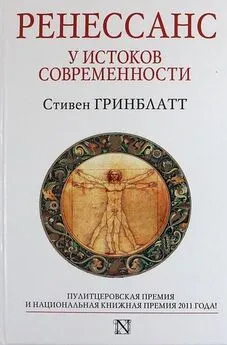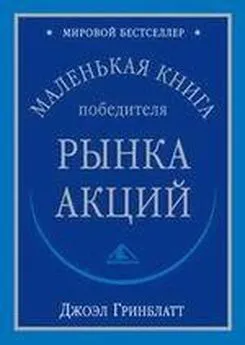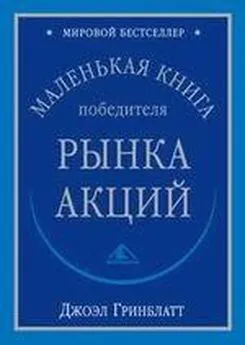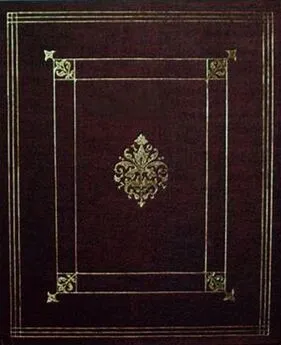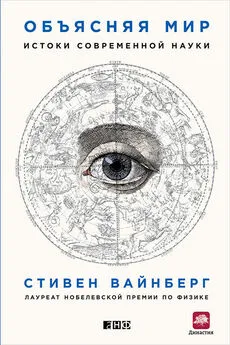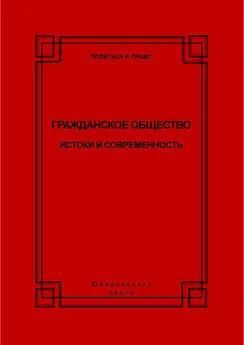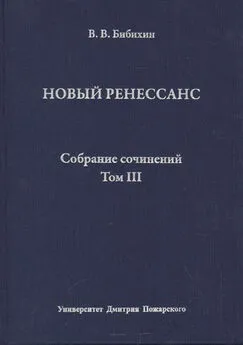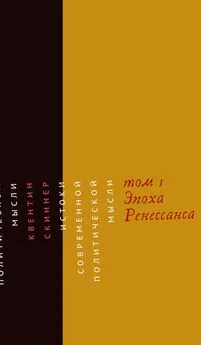Стивен Гринблатт - Ренессанс. У истоков современности
- Название:Ренессанс. У истоков современности
- Автор:
- Жанр:
- Издательство:АСТ
- Год:2014
- Город:Москва
- ISBN:978-5-17-080654-6
- Рейтинг:
- Избранное:Добавить в избранное
-
Отзывы:
-
Ваша оценка:
Стивен Гринблатт - Ренессанс. У истоков современности краткое содержание
Не было бы ни шедевров Леонардо да Винчи и Микеланджело, ни блистательного политического цинизма Макиавелли, ни всей эпохи расцвета наук и искусств, времени создания гениальных произведений живописи, литературы и философии.
Не было бы, если бы однажды собиратель старинных рукописей Поджо Браччолини не натолкнулся в монастырской библиотеке на некий старинный манускрипт…
Так была обнаружена считавшаяся доселе утраченной поэма Лукреция «О природе вещей», пролежавшая в забвении сотни лет.
Рукопись проповедовала крайне «опасные» идеи гуманизма и материализма, учила радоваться жизни, отрицала религиозное ханжество и мракобесие. Она повлияла на формирование мировоззрения Галилея и Фрейда, Томаса Джефферсона, Дарвина и Эйнштейна.
Возрождение поэмы из небытия изменило ход европейской истории.
Ренессанс. У истоков современности - читать онлайн бесплатно полную версию (весь текст целиком)
Интервал:
Закладка:
Prosperi, Adriano. Tribunali della Coscienza: Inquisitori, Confessori, Missionari. Turin: Giulio Einaudi, 1996.
Putnam, George Haven. Books and Their Makers During the Middle Ages. New York: G.P. Putnam's Sons, 1898.
Puyo, Jean. Jan Hus: Un Drame au Coeurde I'Eglise. Paris: Descleede Brouwer, 1998.
Rattansi, Piyo. “Newton and the Wisdom of the Ancients”, in John Fauvel, ed., Let Newton Be! Oxford: Oxford University Press, 1988.
Redshaw, Adrienne M. “Voltaire and Lucretius”, Studies on Voltaire and the Eighteenth Century 189 (1980), pp. 19-43.
Reti, Ladislao. The Library of Leonardo da Vinci. Los Angeles: Zeitlin & Ver-Brugge, 1972.
Reynolds, L.D. Texts and Transmission: A Survey of the Latin Classics. Oxford: Clarendon Press, 1983.
— and N.G. Wilson. Scribes and Scholars: A Guide to the Transmission of Greek and Latin Literature. London: Oxford University Press, 1968.
Reynolds, Susan. “Social Mentalities and the Case of Medieval Scepticism”, Transactions of the Royal Historical Society 1 (1990), pp. 21-41.
Rich, Susanna. “De Undarum Natura: Lucretius and Woolf in The Waves", Journal of Modern Literature 23 (2000), pp. 249-57.
Richard, Carl. The Founders and the Classics: Greece, Rome, and the American Enlightenment. Cambridge, MA: Harvard University Press, 1994.
Riche, Pierre. Education and Culture in the Barbarian West Sixth Through Eighth Centuries, trans. John J. Cotren. Columbia, SC: University of South Carolina Press, 1976.
Richental, Ulrich von. Chronik des Konstanzer Konzils 1414—1418. Constance: F. Bahn, 1984.
Richter, J.P. The Notebooks of Leonardo da Vinci. New York: Dover Books, 1970.
Richter, Simon. Laocoon's Body and the Aesthetics of Pain: Winckelmann, Lessing, Herder, Moritz, Goethe. Detroit: Wayne State University Press, 1992.
Roche, J.J. “Thomas Harriot”, Oxford Dictionary of National Biography (2004), p. 6.
Rochot, Bernard. Les Travaux de Gassendi: Sur Epicure et sur l'Atomisme 1619—1658. Paris: Librairie Philosophique J. Vrin, 1944.
Rosenbaum, Stephen. “How to Be Dead and Not Care”, American Philosophical Quarterly 23 (1986).
.— “Epicurus and Annihilation”, Philosophical Quarterly 39 (1989), pp. 81-90.
.— “The Symmetry Argument: Lucretius Against the Fear of Death”, Philosophy and Phenomenological Research 50 (1989), pp. 353-73.
.— “Epicurus on Pleasure and the Complete Life”, The Monist, 73 (1990).
Rosier, Wolfgang. “Hermann Diels und Albert Einstein: Die Lukrez-Ausgabe Von 1923/24”, Hermann Diels (1848—1922) et la Science de l'Antique. Geneva: Entretiens sur l'Antique Classique, 1998.
Rowland, Ingrid D. Giordano Bruno: Philosopher/Heretic. New York: Farrar, Straus & Giroux, 2008.
Ruggiero, Guido, ed. A Companion to the Worlds of the Renaissance. Oxford: Blackwell, 2002.
Ryan, Lawrence V. “Review of On Pleasure by Lorenzo Valla”, Renaissance Quarterly 34 (1981), pp. 91-93.
Sabbadini, Remigio. Le Scoperte dei Codici Latinie Grecine Secoti XlVe XV. Florence: Sansoni, 1905.
Saiber, Arielle, and Stefano Ugo Baldassarri, eds. Images of Quattrocento Florence: Selected Writings in Literature, History, and Art. New Haven: Yale University Press, 2000.
Santayana, George. Three Philosophical Poets: Lucretius, Dante, and Goethe. Cambridge, MA: Harvard University Press, 1947.
Schmidt, Albert-Marie. La Poésie Scientifique en France au Seizième Stècle. Paris: Albin Michel, 1939.
Schofield, Malcolm, and Gisela Striker, eds. The Norms of Nature: Studies in Hellenistic Ethics. Paris: Maison des Sciences de l'Homme, 1986.
Schottenloher, Karl. Books and the Western World: A Cultural History, trans. William D. Boyd and Irmgard H. Wolfe. Jefferson, NC: McFarland & Co., 1989.
Sedley, David. Lucretius and the Transformation of Greek Wisdom. Cambridge: Cambridge University Press, 1998.
Segal, C. Lucretius on Death and Anxiety: Poetry and Philosophy in De Rerum Natura. Princeton: Princeton University Press, 1990.
Seznec, Jean. The Survival of the Pagan Gods: The Mythological Tradition and Its Place in Renaissance Humanism and Art, trans. Barbara F. Sessions. New York: Harper & Row, 1953.
Shapin, Steven, and Simon Schaffer. Leviathan and the Air- Pump: Hobbes, Boyle, and the Experimental Life. Princeton: Princeton University Press, 1985.
Shea, William. “Filled with Wonder: Kant's Cosmological Essay, the Universal Natural History and Theory of the Heavens”, in Robert Butts, ed., Kant's Philosophy of Physical Science. Boston: Kluwer Academic Publishers, 1986.
Shell, Susan. The Embodiment of Reason: Kant on Spirit, Generation, and Community. Chicago: University of Chicago Press, 1996.
Shepherd, Wm. Life of Poggio Bracciolini. Liverpool: Longman et al., 1837.
Shirley, J.W. Thomas Harriot: A Biography. Oxford: Clarendon Press, 1983.
— Ed. Thomas Harriot: Renaissance Scientist. Oxford: Clarendon Press, 1974.
Sider, David. The Library of the Villa dei Papiri at Herculaneum. Los Angeles: J. Paul Getty Museum, 2005.
— Ed. and trans. The Epigrams of Philodemos. New York: Oxford University Press, 1997.
Sikes, E.E. Lucretius, Poet and Philosopher. New York: Russell & Russell, 1936.
Simonetta, Marcello. Rinascimento Segreto: Il mondo del Segretario da Petrarca a Machiavelli. Milan: Franco Angeli, 2004.
Simons, Patricia. “A Profile Portrait of a Renaissance Woman in the National Gallery of Victoria”, Art Bulletin of Victoria [Australia] 28(1987), pp. 34-52.
.— “Women in Frames: The Gaze, the Eye, the Profile in Renaissance Portraiture”, History Workshop Journal 25 (1988), pp. 4-30.
Singer, Dorothea. Giordano Bruno: His Life and Thought. New York: H. Schuman, 1950.
Smahel, Frantisek, ed. Haresie und Vorzeitige Reformation im Spätmittelatler. Munich: R. Oldenbourg, 1998.
Smith, Christine, and Joseph F. O'Connor. “What Do Athens and Jerusalem Have to Do with Rome? Giannozzo Manetti on the Library of Nicholas V”, in Marino and Schlitt, eds., Perspectives on Early Modern and Modern Intellectual History: Essays in Honor of Nancy S. Struever. Rochester, NY: University of Rochester Press, 2000, pp. 88-115.
Smith, Cyril. Karl Marx and the Future of the Human. Lanham, MD: Lexington Books, 2005.
Smith, John Holland. The Great Schism, 1378. London: Hamish Hamilton, 1970.
Smith, Julia M.H. Europe After Rome: A New Cultural History, 500—1000. Oxford: Oxford University Press, 2005.
Smuts, R. Malcolm, ed. The Stuart Court and Europe: Essays in Politics and Political Culture. Cambridge: Cambridge University Press, 1996.
Snow-Smith, Joanne. The Primavera of Sandro Botticelli: A Neoplatonic Interpretation. New York: Peter Lang, 1993.
Snyder, Jane McIntosh. “Lucretius and the Status of Women”, The Classical Bulletin 53 (1976), pp. 17-19.
.— Puns and Poetry in Lucretius' De Rerum Natura. Amsterdam: B.R. Gruner, 1980.
Snyder, Jon R. Writing the Scene of Speaking: Theories of Dialogue in the Late Italian Renaissance. Stanford: Stanford University Press, 1989.
Spencer, T.J.B. “Lucretius and the Scientific Poem in English”, in D.R. Dudley, ed., Lucretius. London: Routledge & Regan Paul, 1965, pp. 131-64.
Spinka, Matthew. John Hus and the Czech Reform. Hamden, CT: Archon Books, 1966.
.— John Hus: A Biography. Princeton: Princeton University Press, 1968.
Stanley, John L. Mainlining Marx. New Brunswick, NJ: Transaction Publishers, 2002.
Stevenson, J. ed. A New Eusebius: Documents Illustrating the History of the Church to AD 337. London: SPCK, 1987.
Stinger, Charles L. Humanism and the Church Fathers: Ambrogio Taversari (1386—1439) and Christian Antiquity in the Italian Renaissance. Albany: State University of New York Press, 1977.
.— The Renaissance in Rome. Bloomington: Indiana University Press, 1998.
Stites, Raymond. “Sources of Inspiration in the Science and Art of Leonardo da Vinci”, American Scientist 56 (1968), pp. 222-43.
Strauss, Leo. Natural Right and History. Chicago: University of Chicago Press, 1953.
Struever, Nancy S. “Historical Priorities”, Journal of the History of Ideas 66 (2005), p. 16.
Stump, Phillip H. The Reforms of the Council of Constance( 1414—1418). Leiden: E.J. Brill, 1994.
Surtz, Edward L. “Epicurus in Utopia”, ELH: A Journal of English Literary History 16 (1949), pp. 89-103.
.— The Praise of Pleasure: Philosophy, Education, and Communism in More's Utopia. Cambridge, MA: Harvard University Press, 1957.
Symonds, John Addington. The Renaissance in Italy. London: Smith, Elder & Co., 1875—86.
.— Renaissance in Italy. Vol. 3: The Fine Arts. London: Smith, Elder &Co., 1898.
Tafuri, Manfredo. Interpreting the Renaissance: Princes, Cities, Architects, trans. Daniel Sherer. New Haven: Yale University Press, 2006.
Teodoro, Francesco di, and Luciano Barbi. “Leonardo da Vinci: Del Riparo a' Terremoti”, Physis: Rivista Internazionale di Storia della Scienza 25 (1983), pp. 5-39.
Tertullian. The Writings of Quintus Sept. Flor. Tertullianus, 3 vols. Edinburgh: T. & T. Clark, 1869—70.
.— Concerning the Resurrection of the Flesh. London: SPCK, 1922.
.— Ante-Nicene Fathers, ed. A. Roberts and J. Donaldson, vol. 4. Grand Rapids, MI: Wm. B. Eerdmans Publishing Co., 1951.
.— Tertullian's Treatise on the Incarnation. London: SPCK, 1956.
.— Disciplinary, Moral and Ascetical Works, trans. Rudolph Arbesmann, Sister Emily Joseph Daly, and Edwin A. Quain. New York: Fathers of the Church, 1959.
.— Treatises on Penance, trans. William P. Le Saint. Westminster, MD: Newman Press, 1959.
.— Christian and Pagan in the Roman Empire: The Witness of Tertullian, Robert D. Sider, ed. Washington, DC: Catholic University of America, 2001.
Tertulliano. Controgli Eretici. Rome: Citta Nuova, 2002.
Thatcher, David S. Nietzsche in England 1890—1914. Toronto: University of Toronto Press, 1970.
Thompson, James Westfall. The Medieval Library. Chicago: University of Chicago Press, 1939.
.— Ancient Libraries. Berkeley: University of California Press, 1940.
Tielsch, Elfriede Walesca. “The Secret Influence of the Ancient Atomistic Ideas and the Reaction of the Modern Scientist under Ideological Pressure”, History of European Ideas! (1981), pp. 339-48.
Toynbee, Jocelyn, and John Ward Perkins. “The Shrine of St. Peter and the Vatican Excavations”, New York: Pantheon Books, 1957, pp. 109-17.
Trinkaus, Charles. In Our Image and Likeness. Chicago: University of Chicago Press, 1970.
.— “Machiavelli and the Humanist Anthropological Tradition”, in Marino and Schlitt, eds.. Perspectives on Early Modem and Modern Intellectual History. Rochester, NY: University of Rochester Press, 2000, pp. 66-87.
Tuma, Kathryn A. “Cezanne and Lucretius at the Red Rock”, Representations 78 (2002), pp. 56-85.
Читать дальшеИнтервал:
Закладка:
